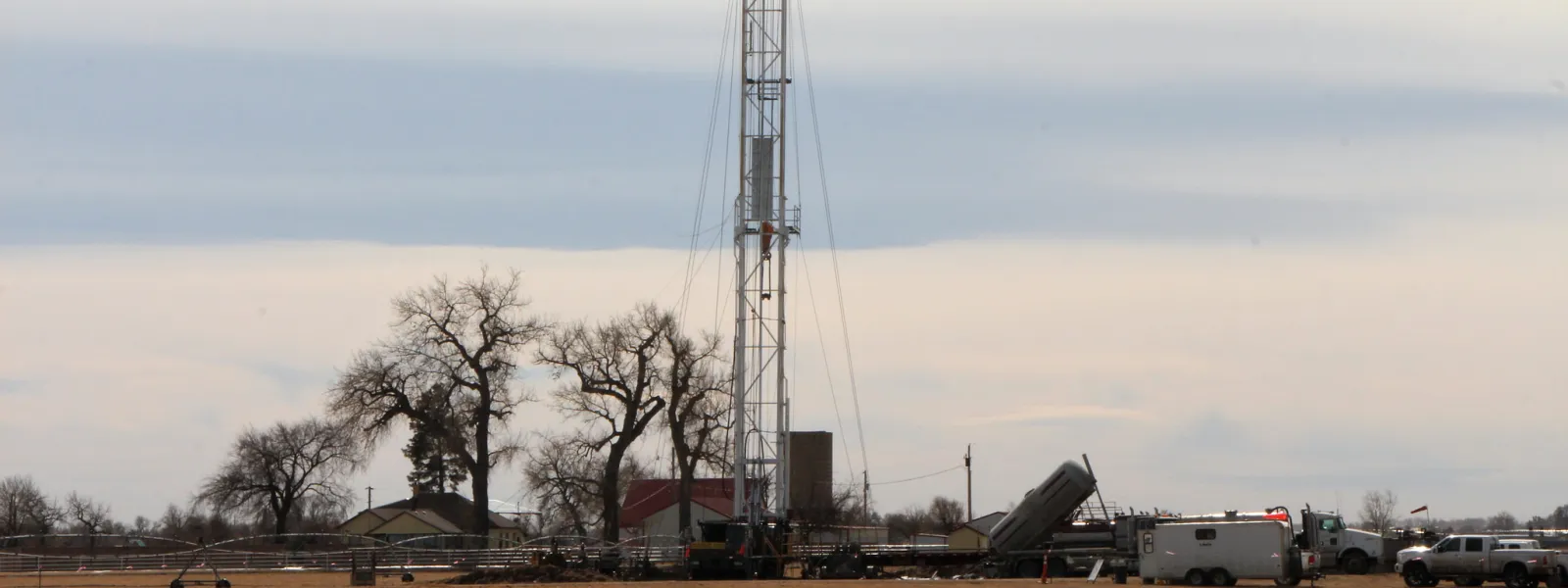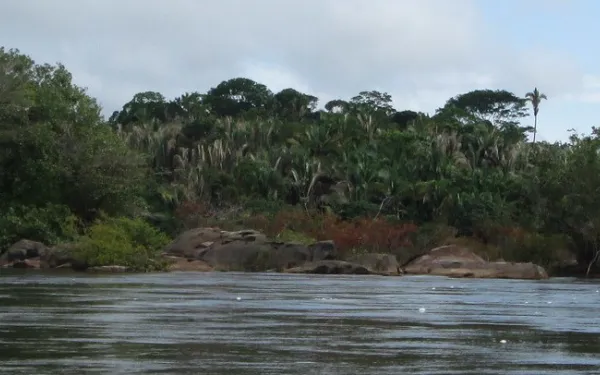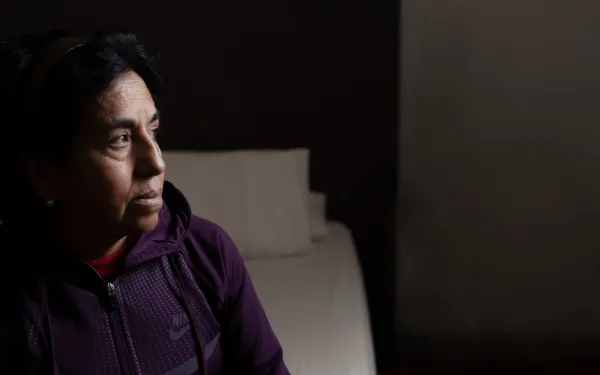
Project
Foto: Andrés ÁngelStopping the spread of fracking in Latin America
“Fracking” is short for hydraulic fracturing, a process used to extract oil and natural gas from historically inaccessible reservoirs.
Fracking is already widespread in the global North, but in Latin America, it is just beginning. Governments are opening their doors to fracking without understanding its impacts and risks, and without consulting affected communities. Many communities are organizing to prevent or stop the impacts of fracking, which affect their fundamental human rights. But in many cases they require legal and technical support.
What exactly is fracking, and what are its impacts?
A straight hole is drilled deep into the earth. Then the drill curves and bores horizontally, making an L-shaped hole. Fracking fluid—a mixture of water, chemicals, and sand—is pumped into the hole at high pressure, fracturing layers of shale rock above and below the hole. Gas or oil trapped in the rock rises to the surface along with the fracking fluid.
The chemical soup—now also contaminated with heavy metals and even radioactive elements from underground—is frequently dumped into unlined ponds. It may seep into aquifers and overflow into streams, poisoning water sources for people, agriculture, and livestock. Gas may also seep from fractured rock or from the well into aquifers; as a result, water flowing from household taps can be lit on fire. Other documented harms include exhausted freshwater supplies (for all that fracking fluid), air pollution from drill and pump rigs, large methane emissions that aggravate global warming, earthquakes, and health harms including cancer and birth defects.
AIDA’s report on fracking (available in Spanish) analyzes the viability of applying the precautionary principle as an institutional tool to prevent, avoid or stop hydraulic fracturing operations in Latin America.
Partners:

Related projects

Unmasking Canada Rights Violations Across Latin America (Executive Summary)
In the 4th cycle of Canada’s Universal Periodic Review (UPR), more than 50 civil society organizations and communities impacted by Canadian business conduct in Latin America and the Caribbean presented three reports that reveal troubling findings.Regional Report: Reveals the status of 37 projects in 9 countries in the region, involving 34 Canadian companies and consortiums. Most of these projects are in the extractive sector (27 mining and 8 oil) and two renewable energy projects (1 hydroelectric, 1 wind). In all of them, human rights have been violated and serious environmental impacts have been reported, impacting Indigenous, Afro-descendant, peasant and fishing communities.Amazon Report: Measures the impact of Canadian companies in the Amazon basin of Brazil, Ecuador, Colombia, and Peru. The report analyzes 12 extractive projects that impact fragile ecosystems and Indigenous communities, demonstrating that Canadian companies systematically violate impacted communities’ human rights and threaten the environment in a region with the greatest biodiversity in the world, which is a strategic space to confront the climate crisis.Oil Report: Assessing Canadian business conduct in eight oil projects in Colombia, Ecuador and Peru, the report reveals how the lack of protection mechanisms, access to justice, and comprehensive redress for impacted peoples and communities, requires Canada to recognize the interconnection between human rights and the environment, and take concrete measures to address the negative impacts of Canadian companies. This is not the first time that Canada has been denounced before the United Nations Universal System for the improper behavior of its companies abroad. During its third UPR, Canada received six recommendations that, despite committing to implementation, evidence presented by civil society in this cycle demonstrates the persistence of non-compliance with its extraterritorial obligations and lack of adequate measures to fulfill the responsibility to regulate the conduct of its companies. View and download the Regional Report (in Spanish)View and download the Amazon ReportView and download the Oil Report (in Spanish)
Read more
Report reveals shocking rights violations by Canadian corporations in Latin America
Geneva - A groundbreaking report titled "Unmasking Canada: Rights Violations Across Latin America" was unveiled at the United Nations Universal Periodic Review Process (UPR) pre-session in Geneva, spanning from August 28 to September 1, 2023. This in-depth investigation highlights extensive human rights and environmental breaches by Canadian companies in Latin America and the Caribbean. Compiled through the collaboration of over 50 civil society organizations, the report implicates 37 Canadian projects across nine countries in the region. Of these, 32 projects have been found responsible for environmental rights infringements, including 105 oil spills in Peru's Block 192, directly linked to Frontera Energy. Additionally, the right to Free, Prior, and Informed Consent was violated in 26 projects, exemplified by dubious practices in Ecuador's Warintza project managed by Solaris Resources Inc. Violent confrontations tied to 16 projects are also highlighted, with a notable incident in Peru in July 2023, where 20 individuals were injured. While Canada positions itself as "climate forward," this report challenges such a portrayal, emphasizing Canada's protection of extractive industries that are responsible for significant human rights and environmental harm. In response to these findings and anticipating Canada's UPR on November 10, 2023, the report advocates for UN member states to impose legally binding resolutions on Canada, compelling the nation to address corporate misconduct overseas. Mauricio Terena, Legal Coordinator from Brazil’s Association of Indigenous People (APIB), said: "We have come here to denounce the involvement of Canadian companies in human rights violations in Brazil, particularly the case of the Belo Sun mining company in Pará, which aims to establish the country's largest open-pit gold mine. While Canada portrays itself as a defender of human rights and the environment, its actions contradict this narrative, especially when infringing upon the rights of indigenous peoples in Brazil. The discrepancy becomes evident when we realize that Canada has not signed the ILO's Convention 169. Therefore, we hope that the states with which we are in dialogue recognize this reality and urge Canada to reassess the operations of its corporations, seeking tangible action in defense of indigenous peoples and traditional communities". Addressing the UPR's function, where every four years UN member states review each other's human rights records, Latin American civil society representatives presented new recommendations for Canada. These recommendations underscore the need for Canada to introduce binding and comprehensive legislation centered on due diligence and corporate accountability. This encompasses the oversight of financial institutions and Canadian corporations throughout their global supply chains, aiming to prevent, mitigate, and penalize corporate misdeeds while ensuring victims of such practices overseas can seek justice and full reparation. "We hope that the UPR (Universal Periodic Review) process will establish itself as another strategy in our defense of indigenous peoples' rights, serving as a tool for the protection of human, indigenous, and environmental rights. It is essential to acknowledge that corporations involved in such violations are committing criminal acts. These actions should not be viewed merely as isolated incidents, but rather on a broader scale, as violating indigenous rights impacts all of humanity. Thus, beyond national and international laws, these transgressions should be seen from a more comprehensive perspective. It is crucial for states to commit, within the UN framework, to join a global mechanism where they recognize the need to monitor and mutually hold each other accountable for actions that uphold human, indigenous, and environmental rights", said Maria Judite "Kari" Guajajara, Legal Advisor at the National Indigenous Organization of the Brazilian Amazon (COIAB). This isn't the first instance of Canada facing allegations within the United Nations Universal System due to the activities of its corporations abroad. Six recommendations were directed at Canada during the 3rd cycle of the Periodic Review. These addressed, among other concerns, Canadian businesses' vital assurance and protection of human rights. Nevertheless, even after pledging to meet these recommendations, Canada consistently failed to fulfill its extraterritorial obligations, neglecting to take effective action to supervise corporate activities domestically and internationally. Gisela Hurtado, Advocacy Manager at Amazon Watch, commented: "Our report unveils the disturbing reality behind Canada's corporate endeavors in Latin America. While Canada boasts of ethical business conduct, the documented evidence reveals a starkly contrasting picture – one where profit is prioritized over people and the environment. Urgent change is paramount." The report's presentation in Geneva was spearheaded by a delegation that included Mauricio Terena from APIB; Maria Judite "Kari" Guajajara from COIAB; Josefa de Oliveira, a Popular Educator with Movimento Xingu Vivo Para Sempre; Lorena Aranha Curuaia, Vice President of the Iawá Community; ; and Brayan Mojanajinsoy Pasos, General Secretary of the Association of Indigenous Councils of the Municipality of Villagarzón Putumayo (ACIMVIP). The delegation was further supported by representatives from organizations including Amazon Watch, AIDA (Regional), Earthworks (US) Gaia (Colombia), and Ambiente y Sociedad (Colombia). Short summary involving Canadian companies involved in rights violations highlighted in the report 1. Frontera Energy in Lote 192 in Peru: - Over 2,000 sites contaminated, affecting 26 Amazonian indigenous communities. - Proposed activity closure plan doesn’t include reparations for affected communities. 2. Mineradora Argentina Gold SRL (joint venture between Barrick Gold and Shandong Gold): - Responsible for at least five toxic substance leakages, including cyanide and arsenic, into the Jáchal River in Argentina from the Veladero mine. - The project is in violation of the Glacier Law due to its location in a glacial zone and affects the UNESCO recognized biodiversity heritage site, the San Guilhermo Reserve. 3. Belo Sun's Volta Grande project in Brazil: - Cumulative impacts with the Belo Monte hydroelectric dam, located less than 10 km away from the prospected mining site; - Armed security forces hired by the Canadian mining company to monitor local leaders and hindering their freedom of movement; - Utter disrespect to Free, Prior and Informed Consent of Indigenous and riverine communities; - Imminent and irreversible risks of an environmental tragedy if toxic waste spills into the Xingu River due to a potential dam break, given the lack of sysmic and tailings dam safety studies. - Direct impact on communities, their traditional livelihoods, and local ecosystems. 4. The Mina Varadero in Chile: - Contaminated water sources with mercury, impacting rural populations and children. 5. ISAGEN - Brookfield Asset Management's Hidrosogamoso dam in Colombia: - Significant harm to local ecosystems and communities. 6. American Lithium's mining projects (Falchani, Macusani, and Quelccaya) in Peru: - Regularly release toxic residues, affecting over 700,000 people and contaminating the Lake Titicaca and Amazon River basins. 7. Solaris Resources Inc.'s Warintza mining project in Ecuador: - Ignored the territorial rights of the Shuar Arutam indigenous people and adopted divisive tactics. 8. Mining project of Ixtaca in Mexico: - Suspended due to violations of indigenous rights. 9. El Pato II mining project in Guatemala: - Affected the Poqomam Maya and mestizo communities without proper prior consultation. 10. Libero Copper's Mocoa mining project in Colombia: - Directly harmed the ancestral territory of the Inga people, violating their rights. 11. Cosigo Resources LTD's Machado gold extraction project in Colombia: - Severely impacted sacred indigenous sites in the Yaigojé Apaporis territory. 12. Barrick Gold's Pueblo Viejo mine in the Dominican Republic: - Forced the displacement of 65 local families due to the El Llagal waste dam. 13. Mining projects of La Plata by Atico Mining Corporation and Las Naves by Curimining S.A. (a subsidiary of Adventus Mining Corporation) and **Salazar Resources Limited in Ecuador: - Tried legalizing their operations despite violating national and international human rights laws, leading to confrontations and injuries. 14. Petrotal's Lote 95 in Peru: - Protests demanding community rights resulted in several deaths by police forces guarding the oil field. 15. Equinox Gold in Brazil: - Concealed data regarding their operations and impacts, including a dam break. - 4,000 of people directly impacted by toxic waste resulted from the dam break that contaminated local Amazonian rivers, violating the right to a clean environment and adequate access to drinking water. - Criminalization of local community leaders that protested for the right to water. 16. Gran Tierra Energy in Ecuador: - Conducted explorations without proper information dissemination in the Charapa, Chanangué, and Iguana blocks.
Read more
Voices seeking justice for the community of La Oroya
The situation of the community of La Oroya in Peru, affected by decades of toxic pollution and the lack of effective government action to combat it, is not an exception in Latin America. Unfortunately, there are many environmental and social sacrifice zones in the continent where highly polluting activities, such as the La Oroya metallurgical complex, are developed. These activities are poorly supervised by the authorities responsible for guaranteeing life, health, personal integrity and other human rights. The importance of the case responds precisely to these realities and transcends the Peruvian context, representing a historic opportunity to set an important precedent for the entire continent. The Inter-American Court of Human Rights, which has yet to rule on the responsibility of the Peruvian state and the reparations to be made to the victims, has taken up the case. In anticipation of the decision, we’d like to share the testimonies of those who have been a key part of the search for justice for La Oroya. They are voices that demonstrate the gravity of the damage caused, and that show that the road to justice has been long, but fruitful. They are voices that express the urgency of guaranteeing a better future for the inhabitants of La Oroya and, ultimately, the effective enjoyment of the right to a healthy environment in the continent. 1. yolanda zurita, petitioner in the case "Community of La Oroya v. Peru" before the Inter-American Human Rights System: 2. anna cederstav, AIDA’s Deputy Director and CFO: 3. Liliana Ávila, Coordinator of AIDA's Human Rights and Environment Program:
Read more